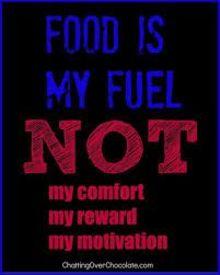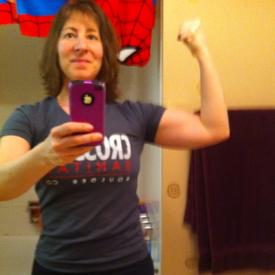We are pleased to announce that on March 4, 2025, an updated Rich Text Editor will be introduced in the MyFitnessPal Community. To learn more about the upcoming changes, please click here. We look forward to sharing this new feature with you!
Bread, baby. Bread.

Katt1320
Posts: 94 Member
So you know it and I know it. Once you even break the surface of basic awareness you realize pretty quicklike that the best way to have non-toxic, natural foods is just "Screw this. I'm making my own!" That's how you get the control back, right?
We've been debating in our home about making our own breads. Tried it? Is it worth it? Any thoughts would be appreciated.
We've been debating in our home about making our own breads. Tried it? Is it worth it? Any thoughts would be appreciated.
0
Replies
-
I have a bread machine, but I rarely use it. Even with a bread machine, making bread is a high maintenance project, and I just don't have time for chores like that. But you can make some amazing deliciousness with it. I don't know how much healthier it is than buying the store-bought stuff though.0
-
I've bought bread at the store many times before and I've never found any toxic bread. Even now I eat bread every day and I'm still alive. Now, if you want to know which bread is the most filling and has (IMO) the best macro ratio I'd say Joseph's Bakery lavash. It's 100 calories, 8g net carbs, and 10g of protein. It's made with flax so it's rich in omega 3's, too. They also make pita breads but I haven't tried those ones.0
-
I've made bread a few times before. It's fun, a bit of work and it takes a little while to get the recipe where you want it (well for me, I'm no chef).
Good news though. There's nothing wrong with regular bread. It's only toxic if you let it go bad.0 -
if it weren't for the bread machine, i would NEVER make bread. even WITH it i rarely make bread.0
-
The biggest advantage is the lack of preservatives in home made bread. I believe that's where the chemical nasties are. I have a breadmaker and use it when I can be bothered but I gain a KG when I sniff bread at the moment so it's off the menu for a while but if you can tolerate bread in your diet and are fine with portion control yes home made bread is worth it. Rosemary and sundried tomato ciabatta being my fave.0
-
Good news though. There's nothing wrong with regular bread. It's only toxic if you let it go bad.
Obviously hasn't "even broken the surface of basic awareness".
I like to get fresh bread from La Madeleine or Corner Bakery. I ain't got no time for making my own.0 -
yes yes yes.
bread should be flour, water and yeast. salt for taste and sometimes oil. nothing else is required.
making your own bread will give you hours of delicious pleasure and you will not wish to eat store-bought again. It is NOT time-consuming - ten minutes to mix and knead the dough is all it takes of active care time. the tricky bit is planning ahead and timing it so it proves properly.
For me, I make a dough in the evening and let it do its first prove, then before bed I mould it into a loaf and put it in the fridge. In the morning I heat up the oven, throw it in and there is just enough time for me to eat fresh bread. Alternatively I do it the other way - make the dough in the morning, let it prove in the fridge, take it out, let it come to room temperature whilst at the gym, then shape and prove, then shove in the oven to cook before bed. It's there for breakfast, all delicious and if your oven goes hot enough, crunchy.
I recommend TheFresh loaf website for ideas and instructions on many breads, although they favour the Peter Reinhart method of kneading - I find that too time consuming (as in have to be in the house) so prefer Richard Bertinet's technique. His 'Dough' and 'Crust' books are excellent.
then go one step further and make a sourdough mother. a sourdough loaf keeps for ages and is beautifully chewy. Sure it takes a few more days to make but what the hell. and it really is easy to make the starter - a bit of flour, a bit of water, time.
I don't favour bread machines. Use them to make a dough by all means, but I find them too dense and a little flavourless.
Making bread is easy, but it's all in the timing.0 -
Good news though. There's nothing wrong with regular bread. It's only toxic if you let it go bad.
In the early 1960's they introduced the so-called Chorleywood Process. This was designed to help small industry make bread. The idea was that by pumping the bread full of enzymes you encourage a faster rise. What it actually did was kill all the cottage industry and enable the mass-produced bread market we know today.
Mass-produced bread has a number of preservatives it just doesn't need. Bread is flour, water and yeast (wild or added). A slower rise to the loaf gives more air within the loaf and allows the yeast to grow and eventually use up its resources. It also allows the gluten to stretch to form the shape of a loaf. Pumping the mix full of enzymes unnaturally speeds up the process and will affect both the quality and its digestibility.
home-made or artisan bread really is better for you than the shop-bought stuff. and it tastes better.0 -
Ezekiel Bread, Best bread for you...
 0
0 -
I always coveted a bread maker but never bought one. I had one friend who made bread every weekend. Soooo good. But I was afraid it would collect dust.
I don't personally eat any bread anymore, but I buy Rudy's brand for my kids. No HFCS. Or, I buy bakery bread, which generally has basic ingredients. My kids like to make challah, which is braided bread and no machine needed. It takes a few tries to get it right, especially since I live at altitude.0 -
I love baking my own bread! Totally worth it. I use alternative flours (oat is my favorite for a traditional style bread), add extra protein, nuts and seeds to make it a more rounded item.
Give it a try! It can be a lot of fun and kneading be a great way to reduce stress at the end of the day.0 -
I used to make bread weekly without a bread machine and it really isn't time consuming if you shut off the TV and work it out kneading instead! I used to love when it first came out of the oven all warm and delicious a pat of butter maybe some jam! Much better than store bought!0
-
i don't eat a lot of bread (just don't like it) but i make one loaf a week for my family from a recipe that requires no kneading. i think the recipe is actually called 'no knead bread'. i make it in an enamel stock pot. it is simple, with less than a half-dozen ingredients. our version includes beer for making it more airy. the taste can easily be changed by adding ingredients as well (like dried apricots).
*edited to take out an extra 'includes'. 0
0 -
Do it!! We don't buy bread, and haven't for almost a year. I have a bread maker and start it up at night before bed, I wake up to fresh bread every 3-4 days. I use this easy, good recipe.
1.5c. all purpose flour
1.5c. whole wheat flour
0.5 c. oats
1.25c. water
2 TBS. EVOO
3 TBS. brown sugar
1 tsp. salt
1.5 tsp. yeast
I tried it with applesauce in place of the EVOO, but it was too chewy. I use the 2 lb. wheat setting with a light crust option.0 -
Good news though. There's nothing wrong with regular bread. It's only toxic if you let it go bad.
In the early 1960's they introduced the so-called Chorleywood Process. This was designed to help small industry make bread. The idea was that by pumping the bread full of enzymes you encourage a faster rise. What it actually did was kill all the cottage industry and enable the mass-produced bread market we know today.
Mass-produced bread has a number of preservatives it just doesn't need. Bread is flour, water and yeast (wild or added). A slower rise to the loaf gives more air within the loaf and allows the yeast to grow and eventually use up its resources. It also allows the gluten to stretch to form the shape of a loaf. Pumping the mix full of enzymes unnaturally speeds up the process and will affect both the quality and its digestibility.
home-made or artisan bread really is better for you than the shop-bought stuff. and it tastes better.
So like I said, not toxic. Thanks.0 -
I am going on a home bread baking course (non-machine) on the 21st April. Pretty exited. Finally I will have my own olive bread and sundried tomato bread and whatnotbread!
 0
0 -
Good news though. There's nothing wrong with regular bread. It's only toxic if you let it go bad.
In the early 1960's they introduced the so-called Chorleywood Process. This was designed to help small industry make bread. The idea was that by pumping the bread full of enzymes you encourage a faster rise. What it actually did was kill all the cottage industry and enable the mass-produced bread market we know today.
Mass-produced bread has a number of preservatives it just doesn't need. Bread is flour, water and yeast (wild or added). A slower rise to the loaf gives more air within the loaf and allows the yeast to grow and eventually use up its resources. It also allows the gluten to stretch to form the shape of a loaf. Pumping the mix full of enzymes unnaturally speeds up the process and will affect both the quality and its digestibility.
home-made or artisan bread really is better for you than the shop-bought stuff. and it tastes better.
So like I said, not toxic. Thanks.
People often seem to fail to understand the meaning of words.0 -
I use my bread machine (more often when not trying to lsoe weight) and the whole family loves it - there's a "quick loaf" recipe which includes an egg and is ready in an hour. You can also get some great bread mixes (some preservatives but not as many
 ). The only issue is the loaves are very tall so slices are big. Sometimes I use it to make bread dough then shape it myself into loaf pans or rolls.
). The only issue is the loaves are very tall so slices are big. Sometimes I use it to make bread dough then shape it myself into loaf pans or rolls.
While I'm really watching the calories I buy Vogel bread - its nearly 100 calories a slice (so lower than Warburtons delcious seeded batch) and small but dense slices. However, it has loads of jhelthy additions like linseed, oatmeal etc so one tiny sandwich actually keeps me going from lunchtime to dinner (mostly).0 -
Good news though. There's nothing wrong with regular bread. It's only toxic if you let it go bad.
In the early 1960's they introduced the so-called Chorleywood Process. This was designed to help small industry make bread. The idea was that by pumping the bread full of enzymes you encourage a faster rise. What it actually did was kill all the cottage industry and enable the mass-produced bread market we know today.
Mass-produced bread has a number of preservatives it just doesn't need. Bread is flour, water and yeast (wild or added). A slower rise to the loaf gives more air within the loaf and allows the yeast to grow and eventually use up its resources. It also allows the gluten to stretch to form the shape of a loaf. Pumping the mix full of enzymes unnaturally speeds up the process and will affect both the quality and its digestibility.
home-made or artisan bread really is better for you than the shop-bought stuff. and it tastes better.
So like I said, not toxic. Thanks.
I didn't say it was toxic. Just that there were plenty things wrong with shop-bought bread.
besides which, mouldy bread is pretty important in the antibiotic industry....0 -
I make bread all the time, and it's delicious. I don't really see it as much of a chore either (I don't have a bread machine). It takes time, but most of the time it takes is when it's proofing, and you don't actually have to do anything during that bit. So worth it IMO (for tastiness, not toxicity reasons.)0
-
I make homemade, non bread machine, bread all the time. Family gets VERY angry when i get lazy! The big thing is finding a 3 hour block in the day! Regular homemade is by far better than bread machine and is not much more difficult! IMHO
I have some good recipes if you want, inbox me I will get pics and send. I have been meaning to get pics anyway as the site has been taken down. breaking-bread with Father Domonic ( I think?) Awesome site that no longer exists. Anyway I have a honey oat bread from there that is only about 77 cals. Not bad for bread 0
Anyway I have a honey oat bread from there that is only about 77 cals. Not bad for bread 0 -
-
I used to bake my own bread but now I can find good bread everywhere.0
-
I bake my own bread when I have a day off to do it. I do not use a machine so I know going it I need about 4 hours to stick around to bake it. I also use my coffee bean grinder to grind up oatmeal and mix that in with the flour. Sure makes the house smell good, and is yummy
 (plus you can cut it pretty thin if you want less bread or cals per slice) 0
(plus you can cut it pretty thin if you want less bread or cals per slice) 0 -
I think there is a reason why every town had a baker before widespread industrialization of food. Making good bread at home is time-consuming and hard to do well.
I am lucky in that I have access to several great bakeries that make tasty wholesome breads.0 -
We've made almost all our own bread for 15 years now. First with a breadmaker (it takes 3 minutes to load it!), then following the instructions in "Artisan bread in 5 minutes a day" (okay, its more than 5 minutes, but most if it is just unattended rise time) and now with a sourdough starter and our kitchenaid mixer. Sourdough has the extra benefit of reducing the glycemic load and gluten content of the final loaf.
Plus: Tasty!
Plus, no funky dough conditioners or mono-di-glycerides
(http://www.bu.edu/bostonia/winter-spring12/corkey/)0 -
i have a bread machine too. love it but put it away a long time ago because it takes time that i dont have. SIGH! but the bread was always delicious, i usually made the cracked wheat, you can buy the box of mix at the store by the cake mixes. it's expensive though.........0
-
Slow cooker bread.
It exists.
It's easy to make.
Yum.
http://busymomsmenuplan.blogspot.com/2012/07/how-to-make-homemade-bread-in-crock-pot.html0 -
I love making bread! I don't have a bread machine and I find kneading the dough to be a really good stress reliever! Its really not that hard. I was nervous the first time I made it...but it came out good so now I love it. I also make my own pizza dough when we make pizzas so I can control what goes into it and can roll it out nice and thin.0
-
I think there is a reason why every town had a baker before widespread industrialization of food. Making good bread at home is time-consuming and hard to do well.
I am lucky in that I have access to several great bakeries that make tasty wholesome breads.
me too. They make it fresh everyday with natural ingredients.
Also, I don't think the OP or the guy with the long scientic explanation for why store bread is no good, LITERALLY thought store bread was toxic. I think we need to chillax. Processed foods over a period of time aren't the best for your health. I think that is what they meant.0
This discussion has been closed.
Categories
- All Categories
- 1.4M Health, Wellness and Goals
- 391.5K Introduce Yourself
- 43.5K Getting Started
- 259.7K Health and Weight Loss
- 175.6K Food and Nutrition
- 47.3K Recipes
- 232.3K Fitness and Exercise
- 442 Sleep, Mindfulness and Overall Wellness
- 6.5K Goal: Maintaining Weight
- 8.5K Goal: Gaining Weight and Body Building
- 153.1K Motivation and Support
- 7.8K Challenges
- 1.3K Debate Club
- 96.3K Chit-Chat
- 2.5K Fun and Games
- 4K MyFitnessPal Information
- 16 News and Announcements
- 926 Feature Suggestions and Ideas
- 2.3K MyFitnessPal Tech Support Questions





















